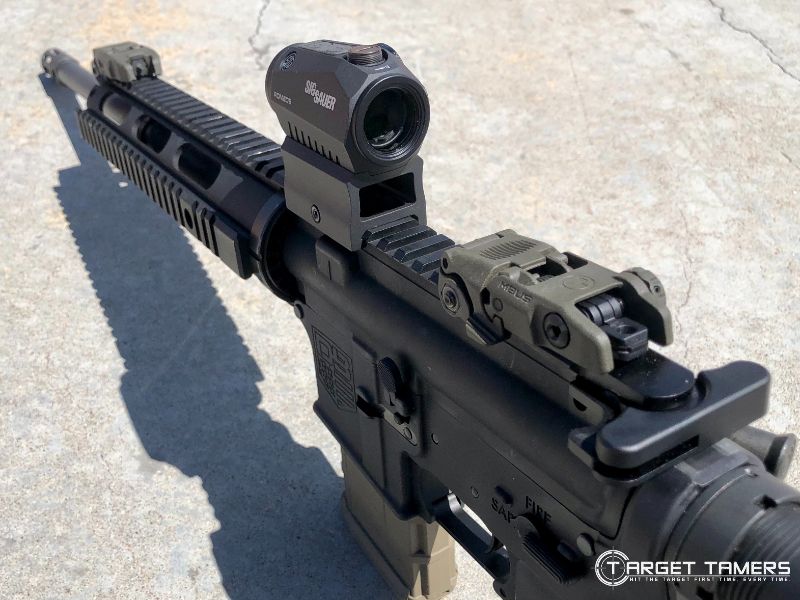This article contains affiliate links. We may earn a small commission if you purchase via these links.
On a tight budget and want to make the most of your hard-earned money?
How do you know which cheap red dot sight is better, and ultimately, which is best for you?
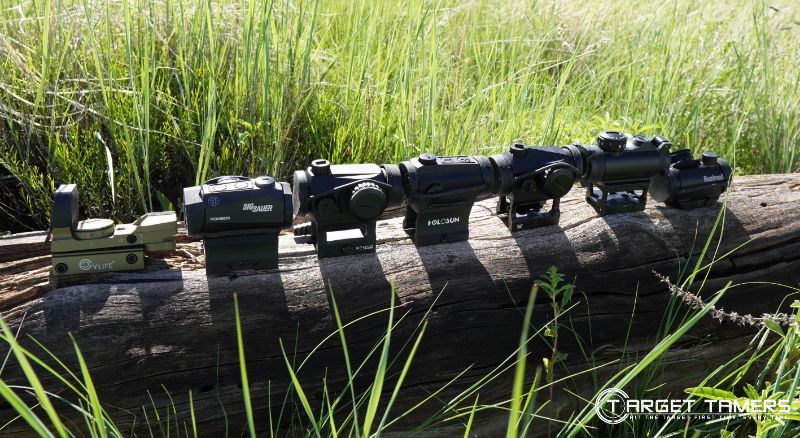
We field-tested every RDS (Red Dot Sight) mentioned here to compare dot size, illumination, turret, and build quality. We also compare battery life, motion activation, night vision compatibility, and mounts.
Here’s your lifebuoy to save you from the sea of confusion and determine what RDS is right for you.
Top Budget Red Dot Sights in 2024
Why Trust Us?
After hundreds of hours of hand-testing red dot sights in the field and at the range, and thousands more hours researching and writing about them, we feel we earn the title of experts when it comes to optics!
We purchase as many of the optics for our tests as possible, and run them through their paces to make sure they will perform at the range and in the field.
Our combined decades of experience from target acquisition and quick sight picture, to big game hunting and competitions has been integral in putting together this round-up of the best budget red dot sights.
Get the inside scoop on how we test optics here.
Budget Red Dot Sight Reviews
First off, let us lay down the groundwork. Since budget can mean something different to everyone, we set the limit to $150 and included a sight for as cheap as $30.
We then hand-picked only the most popular and well-recognized red dot sights in this price range. We purchased each of them and spent all year field testing every single one.
What where the features we tested and compared? In this price range, the minimal expectation of quality in a RDS includes:
- Zero retention
- Accuracy
- Clear FOV
Additional but necessary features will vary between models. These features include:
- Battery life
- Illumination quality
- Fog/waterproofness
- Turret adjustment quality
- Mount type included
Then there are the extra features that set red dot sights apart such as:
- Motion activation
- Night vision compatibility
- Dual illumination
- Multiple reticles
Complete observations about each red dot sight are explained in full in their individual field-tested reviews – be sure to check them out!
In the meantime, having outlined some of the qualifying factors for this line-up, let’s check out the best affordable red dot sights the current market has to offer.
8 Best Budget Red Dot Sights
1. Holosun HS403B – Best Shake Awake Red Dot
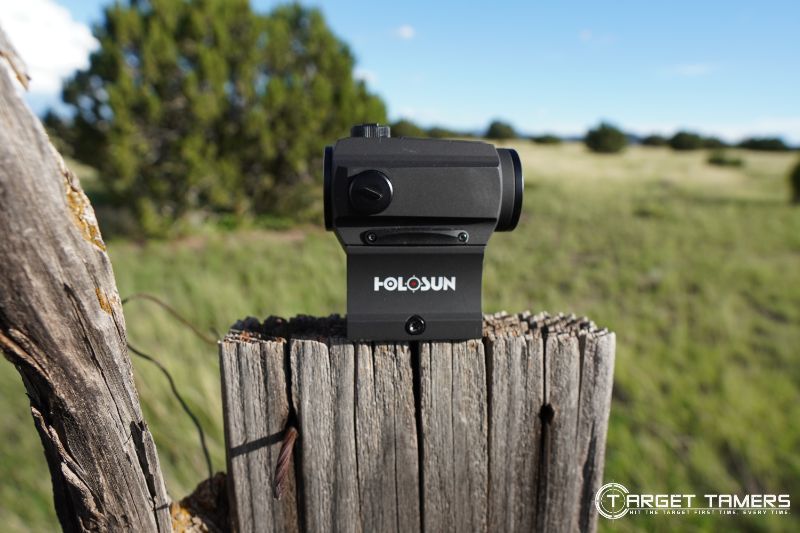
The Holosun HS403B is one of the only, budget red dot sights that can be appropriate for professional applications. With an adjustable motion sensor activated red dot, it proves to be a valuable optic to law enforcement, hunters, and SHTF-prepared civilians.
Pros:
- Shake Awake
- Long battery life
- 12 illumination settings
- Night vision compatible
- Multi-height mounts
Cons:
- Battery compartment tray
There is nothing wrong with the battery tray that houses a CR2032 battery, but it definitely isn't our favorite design! It’s a different design to the dial, and it does require fiddling with tiny screws and a tiny Torx bit to access and then secure it again. This could be devastating if screws were lost in the field.
Fortunately, messing with the tray should hardly ever need to happen as the battery life has an industry long-lasting runtime of 50,000 hours.
During our field testing, the HS403B proved incredibly hardy and very resistant to surface scratches and abuse. It demonstrated complete fog and waterproof competence after surviving a 60-minute downpour of rain.
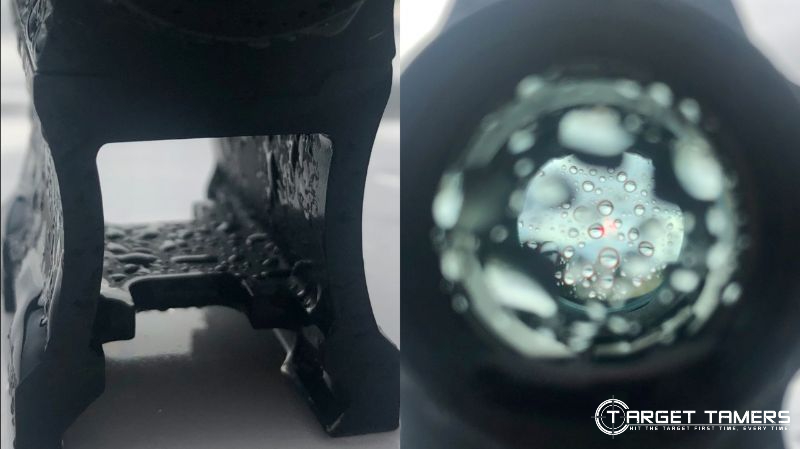
The included mounts are a low-profile and lower 1/3 co-witness. With a T1 footprint, it can be retrofitted with a different T1 mount for absolute co-witness or quick detach alternatives. It has 12 illumination settings in total with two of them dedicated to night vision compatibility.
Being able to adjust the sleep timer between 0-12 hours for the Shake Awake is a major advantage of the Holosun RDS. It’s the one thing that keeps it a step above similar alternatives even in a price range above its own.
Check out difference between Sig Sauer Romeo 5 and Holosun HS403B
2. STNGR Axiom II – Best Red Dot for Beginners
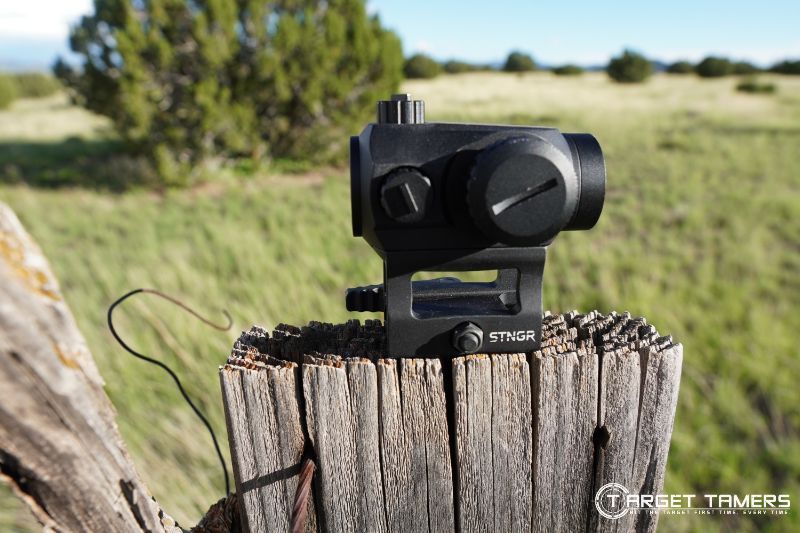
The STNGR Axiom II is a quality red dot sight for beginners given its ease of use, accurate tracking, and low price point. Additionally, it will also serve experienced shooters as it has every fundamental feature that makes it a no-nonsense red dot sight.
Pros:
- Long battery life
- Crisp 2 MOA dot
- 11 illumination settings
- Night vision compatible
- Quick detach mount included
Cons:
- No auto-off
For some who like the feature of having an automatic off, they’ll miss it with the Axiom II. However, the 50,000-hour runtime for the continuous-on advantage of the RDS holds a lot of value in many applications ranging from home defense and law enforcement to hunters.
There is a sense of assurance that comes with knowing the Axiom II is always on. There is no risk that the dot will automatically power down on you when you need it most.
One of our favorite features is that it comes with a QD mount set for a lower 1/3 co-witness with AR sights. It’s been a go-to optic for Target Tamers for many reasons but mostly because of the mount.
The dot is incredibly crisp and even with a refractive error condition, glasses didn’t need to be worn behind it. It could be a great red dot sight for astigmatism. It has 11 brightness settings of which two are night vision compatible, and it works excellently in low light – something red dot sight hunters will appreciate.
Everything about the Axiom II is easy. Turrets are tactile, the illumination knob rotates forwards and backwards past the “0” setting, and it’s conveniently always on. For beginners and experts, it fits the budget and the need.
3. Sig Sauer Romeo MSR – Best Value
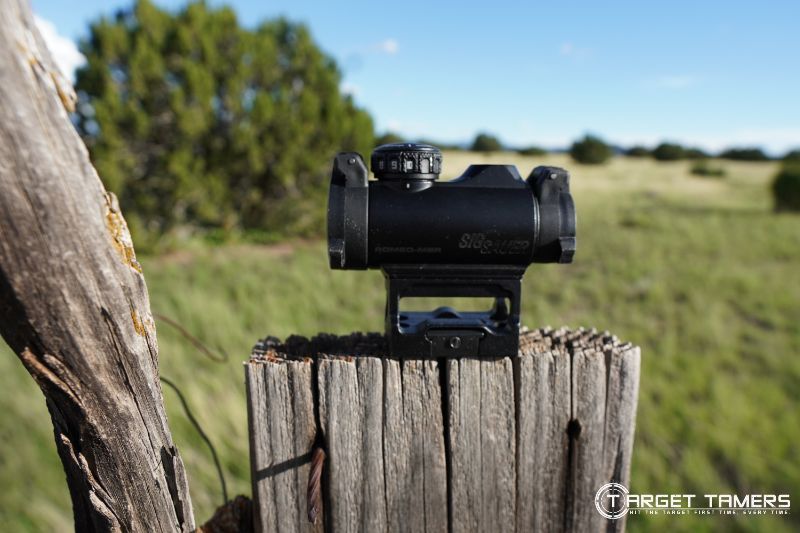
Overall, the Sig Sauer Romeo MSR RDS is perhaps the best red dot sight for value under $100 currently available. This price range can be hit and miss, but the Romeo MSR does not disappoint. Sig Sauer is smart to offer a quality RDS at this low price point.
Pros:
- Price
- Easy to use
- See-thru flip-up caps
- 12 illumination settings
- Fog/waterproof
Cons:
- Stiff illumination dial
The Romeo MSR has a 20,000-hour battery runtime that is still a long time of operation even for a continuous-on RDS. It would only be frowned upon when compared to 50,000-hour alternatives.
It doesn’t take a CR2032 battery and instead requires a CR1632 to operate. It powers the 10 daylight settings of which 1-4 are best for low light conditions. Two separate settings are dedicated for use with NVDs.
One legitimate downside we discovered during hands-on testing was the stiffness of the illumination dial. It’s still as stiff to this day, and you can’t rotate past the NV settings to go into max power. The latter complaint may be trivial to others but is worth noting to set apart sights that do have this capability.
The see-through flip-up caps are awesome as the dot is extremely visible through them. It also adds to the Romeo MSR’s bad-to-the-bone appeal.
The MSR looks the part of a bang-up red dot sight and performs like it. It’s a winning RDS for its value and quality. Packaged in the Romeo MSR and Juliet 3 Magnifier combo, it’s a killer pair.
4. Sig Sauer Romeo 5 – Best Budget Sig Sauer with MOTAC
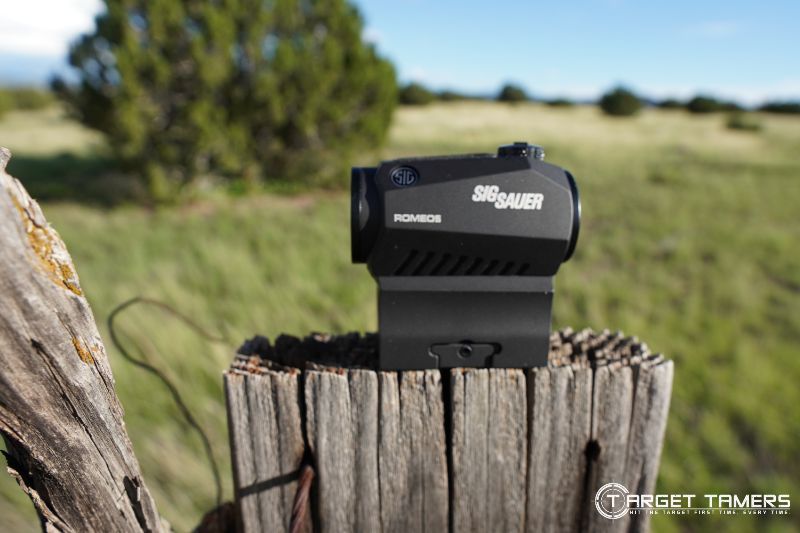
The Romeo 5 is not the cheapest Sig Sauer red dot sight available, but it does have more to offer given that it’s slightly pricier. It’s been a recognized RDS since it hit the market and is no doubt a very popular Sig sight for its performance, price point, and MOTAC feature.
Pros:
- MOTAC
- Tactile turrets
- 10 illumination settings
- Fog/waterproof
- Absolute co-witness mount
Cons:
- Non-adjustable MOTAC
The Romeo 5 automatically powers down the 2 MOA dot after 120 seconds (2 minutes) of non-motion. When motion is detected, it automatically powers back up. Throughout our hands-on experience with the Romeo 5, it performed flawlessly in its function.
However, it cannot be adjusted for longer a longer delay if that is desired. This may be a drawback for some applications like hunting and even for professional use.
MOTAC is very sensitive to the slightest vibrations and movement. So, it could power on with you unaware even while in storage. The CR2032 battery powers the RDS for approx. 40,000 hours.
The button operation on the Romeo 5 is a refreshing change to the very stiff dial of the Sig Romeo MSR. The 2 MOA dot is bright and has 8 daylight settings with two separate settings intended for use with NVDs.
The 1.41” riser mount provides an absolute co-witness. We found it easy to zero in as the turrets track accurately and were impressively tactile and audible.
The Romeo 5 will serve many applications well and buyers will get MOTAC without forking out for a more expensive alternative.
For a comprehensive comparison of the two Sig sights in this review, you can also check out our Romeo MSR versus Romeo 5 article here. This should help you further split the differences between these red dots.
5. Ozark Armament Rhino – Best Full-Size Red Dot Sight
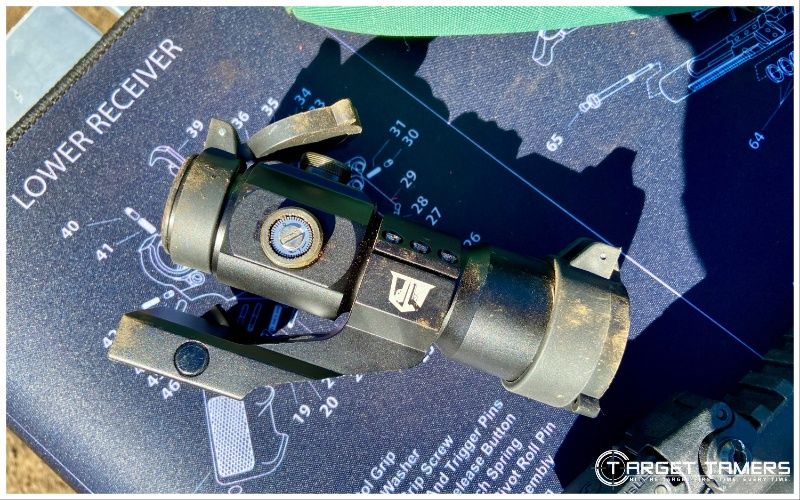
The Ozark Rhino is very similar to the Vortex Strikefire II, but it doesn’t cost as much as the Strikefire. During field-testing, the Rhino punched way above its weight class, and I highly recommend it for its low cost, value, and performance.
Pros:
- Cost
- 4 MOA dot
- Full-size
- Dual illumination
- 0.5 MOA adjustments
Cons:
- Loose tethered caps
The Rhino red dot sight has a 4 MOA dot that’s exceptionally easy to see. I’ve never lost it once during the field-testing process. It has dual illumination, so red and green LED emitters. I prefer the red illumination, and it’s also the better option for dim settings in low light.
The glass is pretty good for a cheap optic. I have no complaints there. I’ve read some complaints about the mount, but in my experience, it’s solid and sturdy. It holds zero well under normal circumstances, and it’s a perfect height for an absolute co-witness with iron sights.
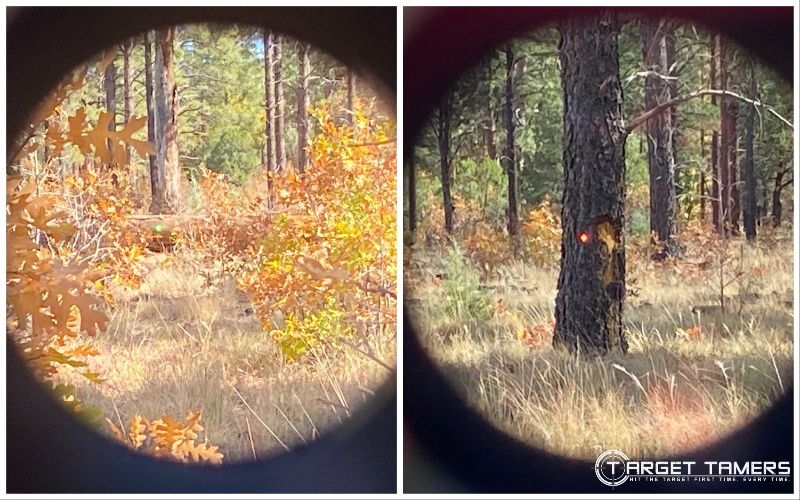
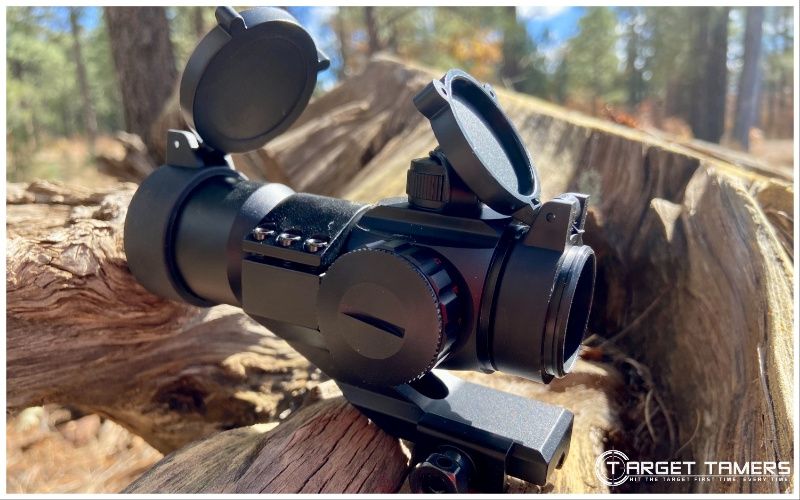
I like that the Ozark Rhino comes with good accessories. The flip-up caps are awesome – they fit well, and they have a positive snap when they’re secured in place. I really liked the tethered adjustments caps, but I lost them in the field. I’m pretty sure they also served to provide some water-resistant benefits too.
The Rhino can take a beating. I put it through some hefty testing, and I’m extremely pleased with the results. For the money, you cannot beat the Ozark Rhino reflex sight at its street price. I actually recommend buying two. One for a friend. Haha, yeah right. It’s going to go on another rifle! Why not?
6. Vortex Crossfire (CF-RD2) – Best Vortex Red Dot for the Money
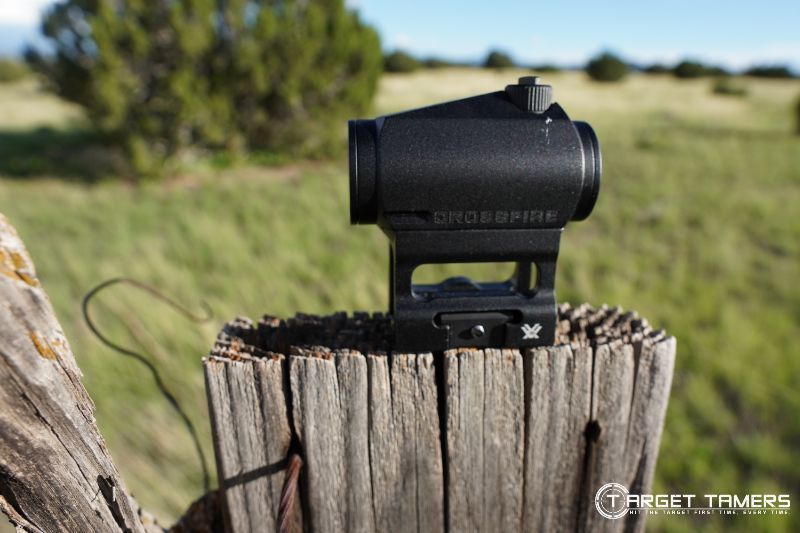
In general, the Crossfire is the most affordable Vortex red dot sight. As a result, it’s popular for quality, performance, and the VIP warranty it comes with. For the money, the RDS is as simple as it gets but is just right when it comes to the basics.
Pros:
- Long battery life
- Continuous-on RDS
- Fog/waterproof
- Night vision compatible
- Low-profile & riser mounts
Cons:
- Compact size
Having a compact length at 2.5”, light weight of 5.2 oz, and an oversized illumination dial are advantages. However, combine the short length and huge dial complete with a windage turret on the side, and you have a combo that makes for a tight fit.
This one aspect was a downside during our field testing as the small space between the turret and the knob made illumination changes vexing. To top that, the knob itself was on the tough side to turn, and it doesn’t rotate past the “off” setting.
Other than those inconveniences, the Crossfire impressed us with its tactile turrets that were crisp with perfect resistance so as not to overshoot. With a CR2032 battery, it runs for 50,000 hours as a continuous-on RDS.
It has 11 illumination settings with two that are night vision compatible. Though it performs excellently in low light conditions, max brightness was our illumination of choice for daylight and normal conditions.
The Crossfire survived being submersed in water with no sign of internal fogging. However, the anodized finish is prone to showing up every scratch and gash it suffers - and suffer it does in our hands! It comes with a low-profile mount and a lower 1/3 co-witness mount in the box.
Though our critiques of the Crossfire are blunt, it’s a reliable RDS with satisfactory performance. Backed by the VIP warranty, the Vortex RDS has a leg up on alternatives.
Speaking of alternatives, check out our Vortex Crossfire VS Romeo 5 article if you want an in-depth head-to-head comparison of these two sights.
7. Bushnell TRS-25 – Top Rated Red Dot Sight
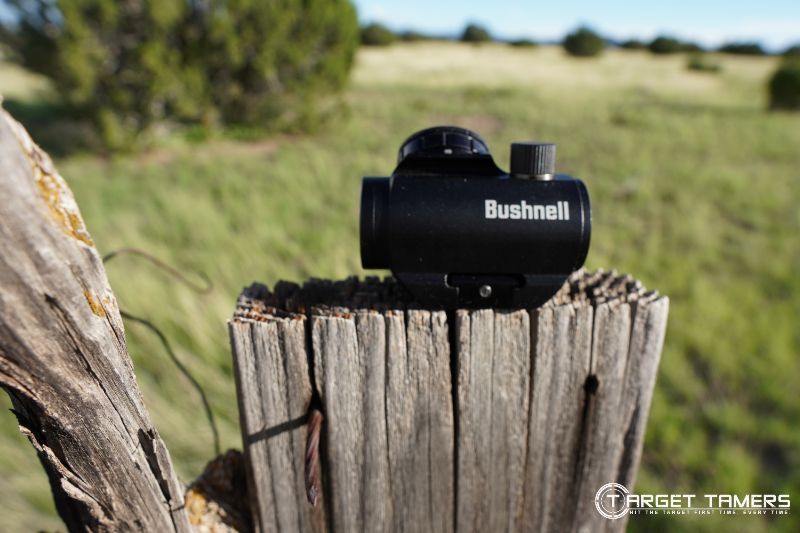
The Bushnell TRS-25 was considered the cheapest red dot sight for a long time. As far as “brand-name” gear goes, the TRS-25 is the cheapest RDS in the market. As such, it’s little wonder why it’s an unbeatably top-rated sight in the market today.
Pros:
- Price
- 3 MOA dot
- Easy to use
- Accurate turrets
- Fog/water-resistant
Cons:
Battery life
With only a 5,000-hour (approx.) battery life runtime, it’s a poor comparative to alternatives. However, even those inexpensive alternatives can’t compete with the price point that is sometimes seen for under $50.
The TRS-25 is still revered as a top budget red dot sight for its basic performance. Though it can be defined as a continuous-on RDS, with its low battery life, it’s recommended to do your best to power it down after use. As such, it’s not the sight for home defense or duty rifles but is a great option for range work and some varmint hunting.
The turrets were much better than expected as confirmed during our hands-on field test. They were adequately tactile and tracked fantastically for zeroing at 50 yards.
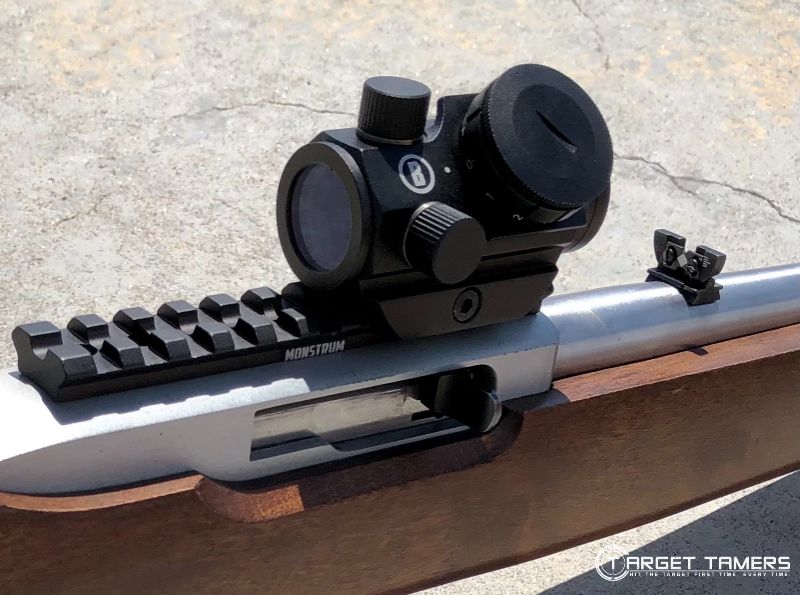
One thing to note is that it comes with an integrated low-profile mount. While a good fit for 10/22s, shotguns, or AKs, you will need to purchase a separate riser mount with a rail on top to pair with sights on an AR-15.
There is no denying that the TRS-25 is budget and basic. However, there’s also no denying that it’s affordable and it works. For recreational use and some limited hunting, it’s a decent optic to have as a daily workhorse. It is one of the best-rated red dots for Ruger 10/22.
8. CVLife 1x22x33 – Best Cheap Red Dot for 10/22
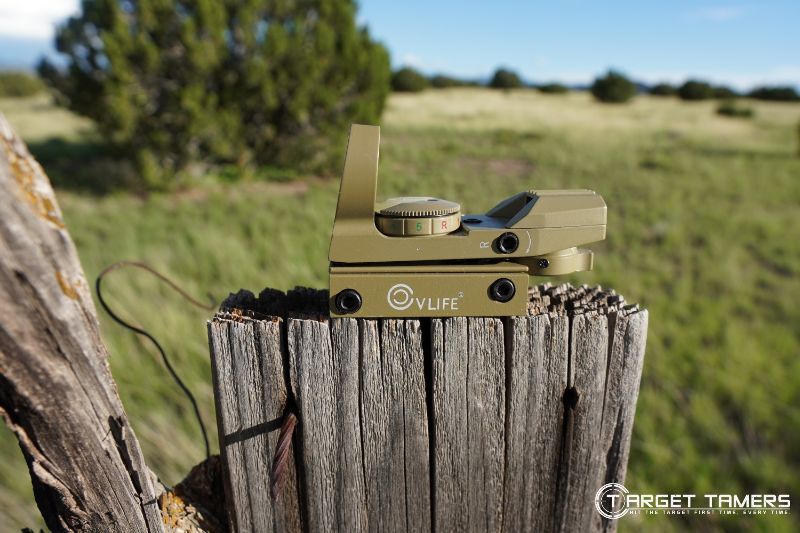
For the money, the CVLife 1x22x33 red dot sight offers a ton of value for its many features including its dual red and green illumination. In addition to its two LED colors, it has multiple reticles. There’s a lot to like about the CVLife RDS and it’s not limited to its cheap price.
Pros:
- Price
- Dual illumination
- 4 reticles
- Water resistant
- Integrated mount
Cons:
- Mushy turrets
We discovered during our field test of the CVLife RDS that it has extremely mushy turrets. They’re only tactile in one direction while the other direction tends to overshoot adjustments. Regardless, it successfully zeroed in for close-quarter ranges and holds zero well once the quirks are figured out.
Those quirks are more-or-less related to its extra features. We discovered that zero retention is best acquired with choosing one LED color for the job as there can be a POI shift when switching between them. But with as easy as the CVLife RDS is to use, it will be figured out quickly.
The multiple reticles are a fantastic feature as they’re crisp, easy to see, and very fast to switch between. The dot reticle is the least bright of all four, but neither reticle required wearing prescription glasses to get a sharp shape – impressive.
The 22x33mm window has excellent color fidelity free of distortion. There is a visible reflection of the emitter housing, but we found that it’s mostly a non-issue when you’re focused on a target downrange.
It worked exceptionally well with a 3x magnifier behind it to get better seeing at longer ranges. With the integrated mount, it sits perfect on a 10/22 and yet did great for an absolute co-witness with MBUS sights.
It’s not the most rugged nor the most accurate RDS in the market, but for the money, it holds its own. For all recreational kinds of shooting, the CVLife is a top recommendation for under $50.
What to Look for in a Budget Red Dot Sight
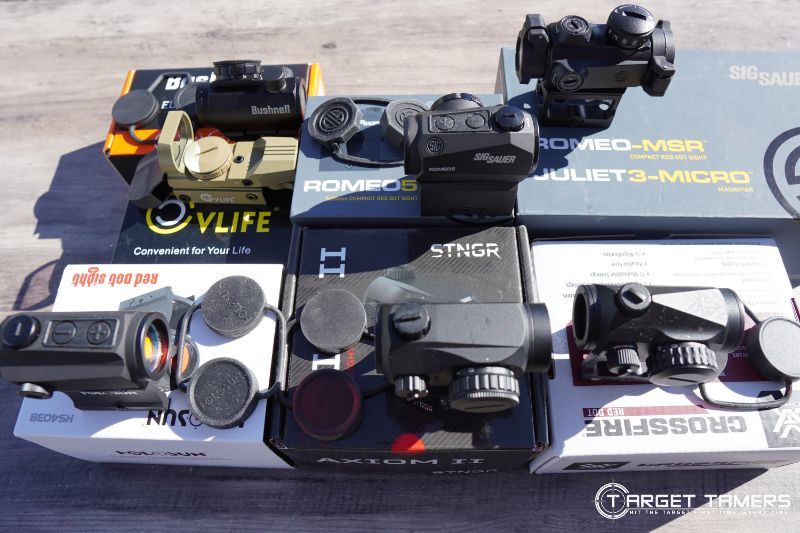
In general, once the terminology is learned and how each component of a RDS comes together, it will be easier to spot the right optic for the application that fits the budget. The following guide covers everything from dot size to illumination, mounts, and more.
Price
Field Notes: Priced at under $150 and taking into consideration quality and features, the Sig Sauer MSR is our pick of the best value red dot sight in this line-up, with the Ozark Rhino a very close runner-up. The CVlife was the cheapest sight we tested at under $30.
Though a budget of $150 means something different from one person to the next, there is little difference between $50-$100 red dot sights. Then, there are only few differences between $100-$150 red dot sights.
Performance is likely to be similar between them all. Some generalities are observed such as the cheaper the RDS, the softer the turret adjustments. The more expensive the RDS, the better the build quality.
| Product | Price Range | Features |
|---|---|---|
| Holosun HS403B | Under $150 | Shake Awake, 50,000 hours, 12 illumination settings, NV compatible, multi-height mounts, battery tray |
| STNGR Axiom II | Under $120 | 50,000 hours, continuous-on, Crisp 2 MOA dot, 11 illumination settings, NV compatible, QD mount |
| Sig Sauer Romeo MSR | Under $100 | Continuous-on, 11 illumination settings, NV compatible, see-thru flip-up caps |
| Sig Sauer Romeo 5 | Under $130 | MOTAC, 10 illumination settings, button operation, absolute co-witness mount |
| Ozark Rhino | Under $50 | Continuous-on, dual illumination, 4 MOA dot, absolute co-witness cantilever mount, full-size red dot sight |
| Vortex Crossfire | Under $150 | 50,000 hours, continuous on, 11 illumination settings, NV compatible, multi-height mounts |
| Bushnell TRS-25 | Under $100 | 3 MOA dot, integrated low-profile mount, compact & lightweight, 11 illumination settings |
| CVLife 1x22x33 | Under $50 | Multiple reticles, dual illumination, integrated lower 1/3 co-witness mount, open HUD design |
Dot Size
Overall, the smaller the dot, the harder it is to see it, and the larger the dot, the easier it is to see. However, there are common rules as it relates to dot size. The small dot is better for mid ranges and preciseness, while the larger dot is better for CQB and rapid target acquisition.
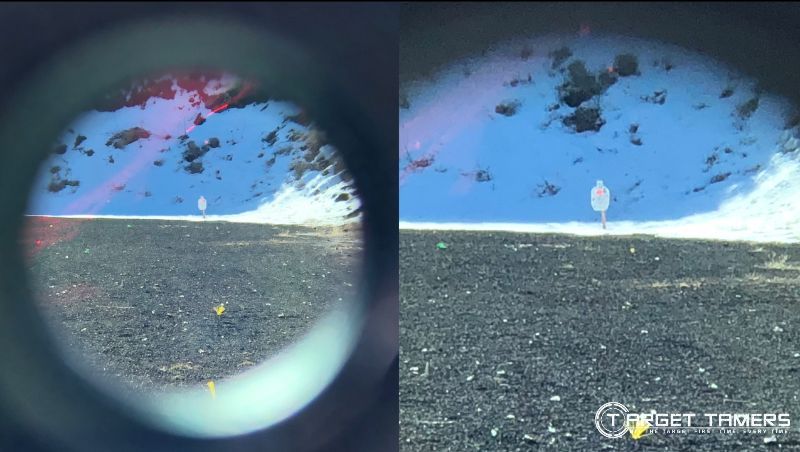
Many reflex sights for rifles will have 2-4 MOA dots while sights for handguns will have 3-6 MOA dots. 1 MOA equals 1.047” at 100 yards but it’s acceptable to round to 1” at 100 yards.
This relates because a 2 MOA dot will cover 1” at 50 yards, 2” at 100 yards, 4” at 200 yards, etc. How much is covered up by the dot is called subtension. On the same principle, a 3 MOA dot will cover 1.5” at 50 yards, 3” at 100 yards, 6” at 200 yards, etc.
As you can see, the relationship between dot size and subtension will be a matter of personal preference and application. If you’re expecting to shoot out to 100 yards often and require a good amount of precision for a RDS, a 2 MOA dot is ideal. If you’re in tight quarters or you professionally train for 25-yard targets, a 6 MOA dot may be better.
| Product | Dot Size |
|---|---|
| Holosun HS403B | 2 MOA |
| STNGR Axiom II | 2 MOA |
| Sig Sauer Romeo MSR | 2 MOA |
| Sig Sauer Romeo 5 | 2 MOA |
| Ozark Rhino | 4 MOA |
| Vortex Crossfire (CF-RD2) | 2 MOA |
| Bushnell Trophy TRS-25 | 3 MOA |
| CVLife 1x22x33 | Variable (multiple reticles) |
Motion Sensor Activation
In general, the point of motion sensor activation is to provide a red dot sight that is instantly ready when you draw your weapon and one that can automatically power down when not in use. The goal is to conserve battery life but be dependably ready for action when the need arises.

Field Notes: Of the seven sights tested, only the Holosun HS403B and the Sig Sauer Romeo 5 have motion activation features. Of the two, the Holosun is the standout for us due to the ability to program the Shake Awake feature. As for battery life, despite being a continuous-on red dot sight, the STNGR Axiom II is awarded as the standout here since, among other reasons, it is the cheapest of the three red dot sights with the longest battery life (50,000 hours).
Though it’s a functional feature to have, do you really need it?
One contending feature to be aware of is battery life. Not all motion sensor red dot sights have superior battery run-times to that of continuous-on sights. It’s comparable at best.
For example, the Romeo 5 has MOTAC with a battery life of 40,000+ hours. Now that we have sights like the Axiom II and the Vortex Crossfire that provide 50,000 hours being left on the entire time, it adequately competes with motion activated alternatives.
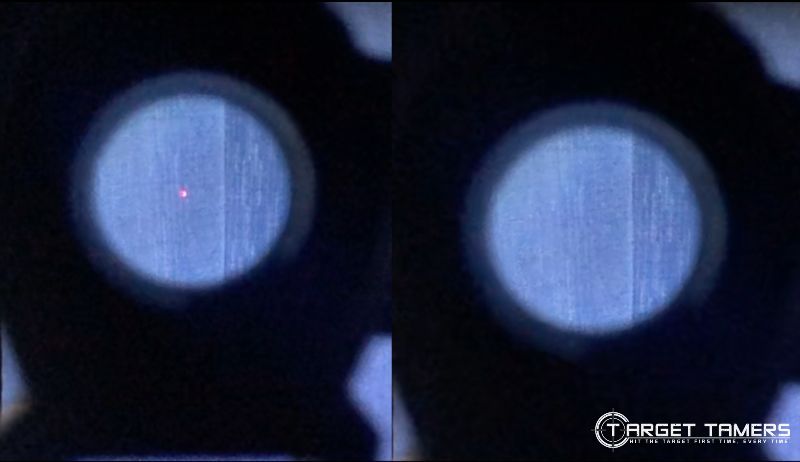
Another feature to consider is the sleep timer. This would be the time it takes between the dot powering down after a period of non-motion. Some RDS have an adjustable sleep timer whereas others do not. The dot may turn off after two minutes, 60 minutes, or after several hours. Being able to adjust the timer can be the deciding factor of whether that same RDS can serve while on duty and then again in the hunt.
One more point to raise is quality. This is extremely important as you place a lot of trust in the optic for life-saving engagements or dangerous game hunting when an RDS is often used. With failing batteries aside, you must trust that your dot will work, that it will turn on when you draw your weapon, and that it will not fail. One benefit of a continuous-on RDS is that it’s always going to stay on.
What red dot sights are motion activated?
| Product | Motion Sensor | Adjustable Timer | Manufacturer Term | Battery Life |
|---|---|---|---|---|
| Holosun HS403B | Yes | Yes, 0-12 hours | Shake Awake | 50,000 hours |
| STNGR Axiom II | No, continuous-on | N/A | N/A | 50,000 hours |
| Sig Sauer Romeo MSR | No, continuous-on | N/A | MOTAC | 20,000 hours |
| Sig Sauer Romeo 5 | Yes | No, 120 seconds | MOTAC | 40,000 hours |
| Ozark Rhino | No, continuous-on | N/A | N/A | 3,000 hours |
| Vortex Crossfire | No, continuous-on | N/A | Motion Activation Capable | 50,000 hours |
| Bushnell TRS-25 | No, continuous-on | N/A | N/A | 5,000 hours |
| CVLife 1x22x33 | No, continuous-on | N/A | MOTAC, Motion Awake | Unknown |
Night Vision Compatible
Many red dot sights will have night vision compatible settings for use with passive night vision devices. This is essential to consider as too bright of an LED can cause damage to an NVD. Even the dimmest settings can cause bloom ruining the FOV night vision adaption.
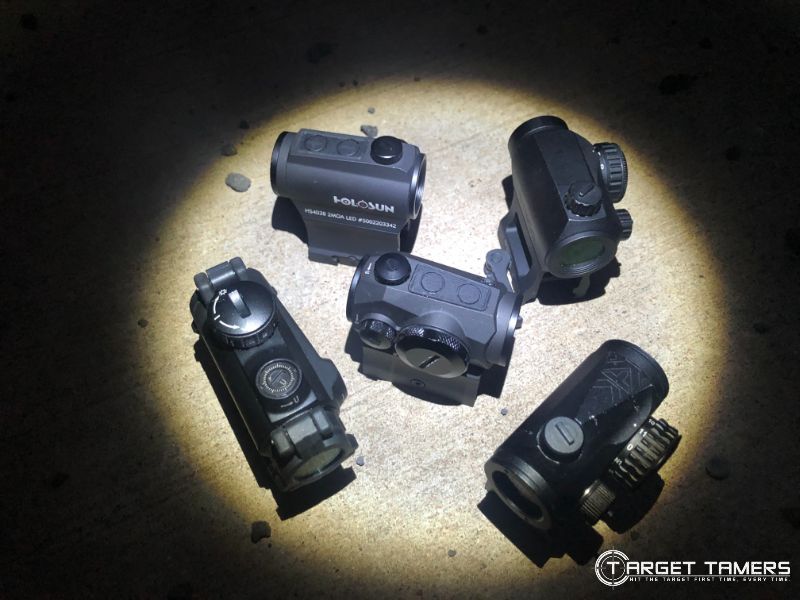
Field Notes: Of the seven tested sights, all except the cheapest two are night vision compatible. Of the five remaining NV compatible sights, the ones with the dimmest settings are both Sig sights, the Vortex and Holosun. Of these, if you want the cheapest night vision compatible RDS, that will be the Sig Sauer Romeo MSR. For maximum features, the Holosun HS403B wins this section.
You shouldn’t be able to discern the dot with the naked eye while it’s in a NV setting, but it will become visible in front of an NVD. Having an aiming point with a NV monocular or goggles can create a versatile setup for multiple applications. This is what is intended for NV compatible red dot sights.
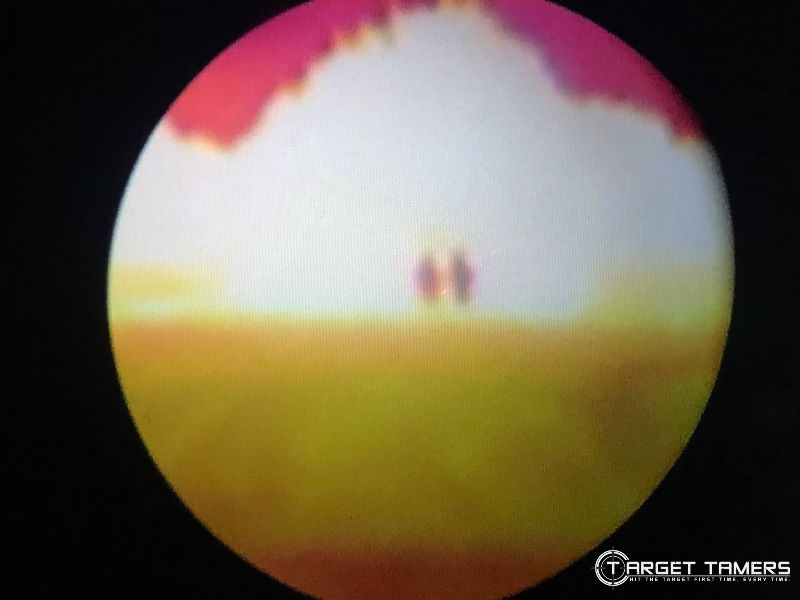
To quickly clarify, NV compatible red dot sights do not have night vision. They are only suitable to be worked in tandem with an NVD.
To those who do not have an NVD, you may not be concerned about having the capability to do so. But since many of the best RDS often have it, consider it a feature tucked away for the possible future in which you do acquire NV.
| Product | NV Compatible | NV Compatible Settings |
|---|---|---|
| Holosun HS403B | Yes | 2 NV illumination settings |
| STNGR Axiom II | Yes | 2 NV illumination settings |
| Sig Sauer Romeo MSR | Yes | 2 NV illumination settings |
| Sig Sauer Romeo 5 | Yes | 2 NV illumination settings |
| Ozark Rhino | No | N/A |
| Vortex Crossfire CF-RD2 | Yes | 2 NV illumination settings |
| Bushnell TRS-25 | No | N/A |
| CVLife 1x22x33 | No | N/A |
Turret Quality
One of the most unforgiving traits of an optic is soft or mushy turrets. Most people prefer tactile and audible feedback as a sign of precise tracking. If turret adjustments cannot be discerned, there is little to no confidence in the accuracy of the red dot sight.
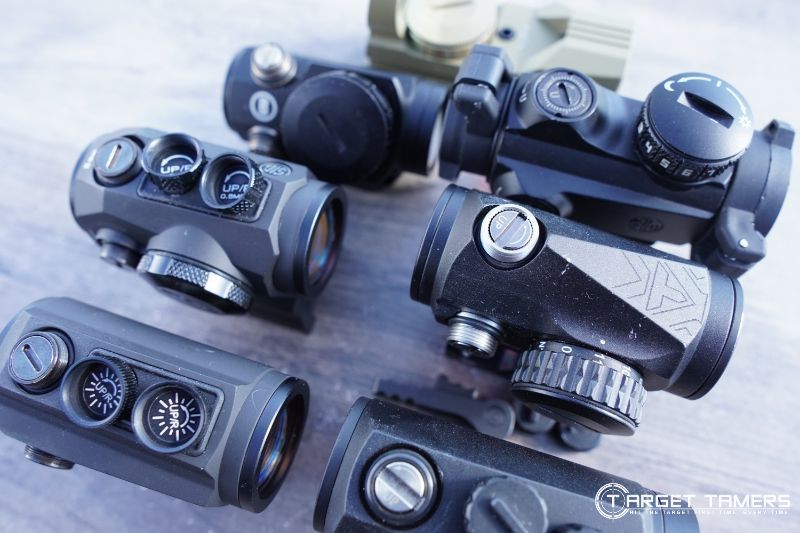
Field Notes: The Vortex Crossfire 2, with 1 MOA adjustments, had the best balance between resistance and easy adjustments. This made every adjustment intentional without any overshooting. A close second was a tie between the Romeo 5 and the Holosun which both have 0.5 MOA adjustment values, caps that serve as adjustment tools and included multi-tools. The prize for the worst turrets went to the CVLife 1x22x33.
Some turrets can be acceptably poor. For example, the CVLife RDS has only tactile clicks in one direction but are mushy in the other. It was adequate enough so as to follow that it tracked, and zeroing was achieved.
There is a pattern that turret quality is generally poor to fair in a red dot sight under $100. Then there is quite the significant difference if you spend a little more in the $100-$150 range.
There are some exceptions to the rule such as the Sig Sauer Romeo MSR under $100 that has audible, tactile clicks but can be easy to overshoot.
As a side note, red dot sights with caps that serve as the tools to make adjustments are a convenient and very welcome feature.
| Product | Adjustment Values per Click | Double-duty Caps |
|---|---|---|
| Holosun HS403B | 0.5 MOA | Yes |
| STNGR Axiom II | 1 MOA | Yes |
| Sig Sauer Romeo MSR | 1 MOA | No, uncapped, multi-tool included |
| Sig Sauer Romeo 5 | 0.5 MOA | Yes |
| Ozark Rhino | 0.5 MOA | No |
| Vortex Crossfire | 1 MOA | Yes |
| Bushnell TRS-25 | 1 MOA | No |
| CVLife 1x22x33 | 1 MOA | No, uncapped, Hex key included |
Build Quality
Though very little may be expected in build quality, some budget red dot sights are just as rugged as their more expensive counterparts. It’s always recommended to have a RDS that is both fog and waterproof to prevent moisture and dust from getting into a closed tubed RDS.
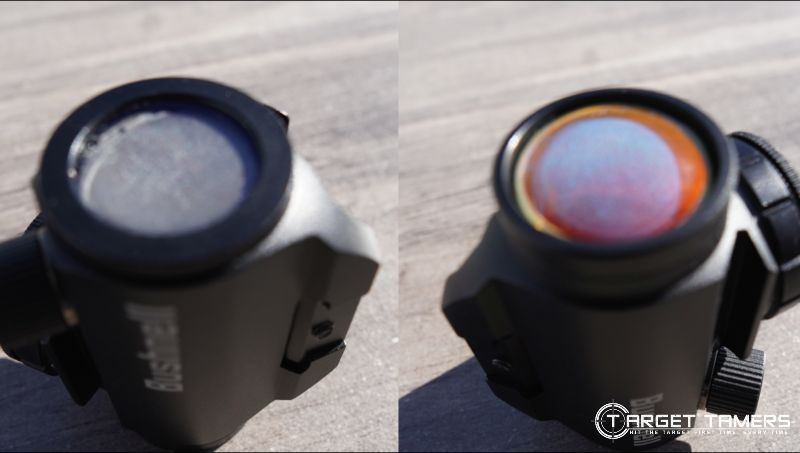
Field Notes: The Sig Sauer MSR was the standout in terms of build quality, in large part due to the inclusion of see-through flip-up caps. Neither the CVLife, nor the Bushnell TRS-25, proved to be waterproof, but all others held up to submersion or heavy rain. The Vortex Crossfire suffered the most surface damage despite similar treatment during testing.
Open HUD sights still need to be waterproof to prevent water from getting into the battery compartment and LED emitter housing.
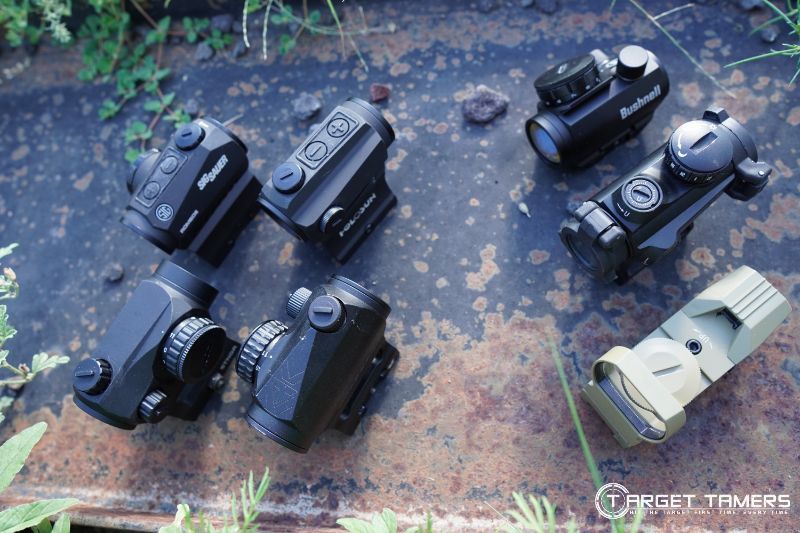
As expected, some sights are better than others when it comes to how much it holds up to the weather, abuse, and repeated recoil. Generally, $100-$200 red dot sights are likely to be better made than those under $100 though the differences may not be significant.
| Product | Material | Finish | Fog/Waterproof | Rating | Recoil Rating |
|---|---|---|---|---|---|
| Holosun HS403B | Aluminum | MAO | Yes | IP67 | 1000G |
| STNGR Axiom II | Aluminum | Anodized matte | Yes | IPX7 | 600G |
| Sig Sauer MSR | Aluminum | Anodized matte | Yes | IPX7 | 500G* |
| Sig Sauer Romeo 5 | Aluminum | Anodized matte | Yes | IPX7 | 500G* |
| Ozark Rhino | Aluminum* | Anodized matte* | Water-resistant only | IP65 | 500G* |
| Vortex Crossfire | Aluminum | Anodized matte | Yes | IPX7 | 500G* |
| Bushnell TRS-25 | Aluminum | Anodized matte | Yes with caps on | IP67 | 500G* |
| CVLife 1x22x33 | Aluminum & plastic | Anodized matte | Water-resistant only | IPX4 | Unknown |
Illumination
Red dot illumination will have everything to do with where, how, and when it can be used. "Daylight bright" is a term that is used often but is difficult to distinctly define. The consensus is dot illumination must be visible and just as fast to use with two eyes open in bright, sunny conditions.
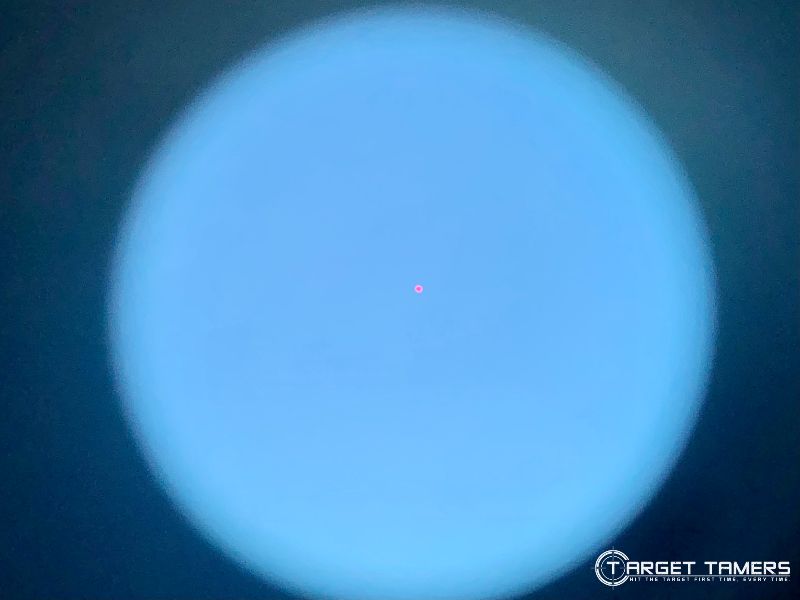
Some dots perform better than others against white, reflective surfaces like snow and white walls in the sun. Filming all of this to show others is extremely difficult, and while the camera may not show it, it may very well still be visible to the person behind the RDS. Keep in mind, that performance such as this in very extreme conditions isn’t needed by everyone.
Field Notes: The best performing sights in daylight bright conditions were both of the Sig sights and the Holosun. The CVLife was the least bright of all 7 sights, even at max brightness, making it the slowest dot to find in bright conditions.
Another consideration is low light performance. Sometimes illumination cannot get dim enough to prevent blooming and FOV washout. The optic is already competing with ambient conditions and sometimes inclement weather making resolution and vision difficult. Bright illumination will cause the dot to starburst, and washout caused by blooming makes seeing anything in the FOV practically impossible.
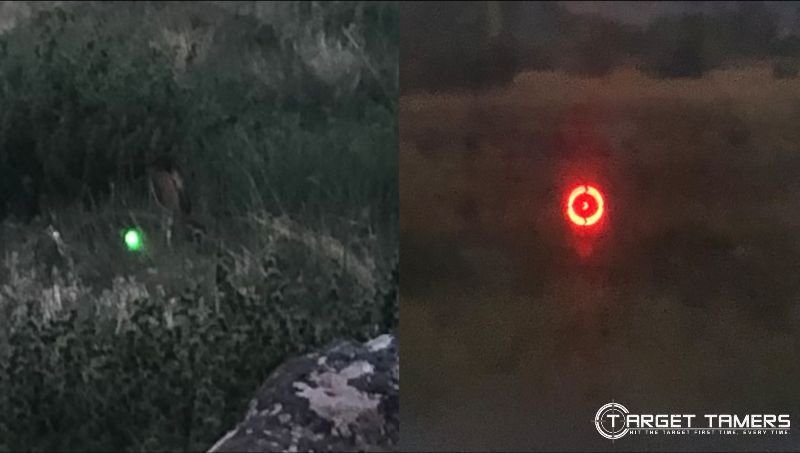
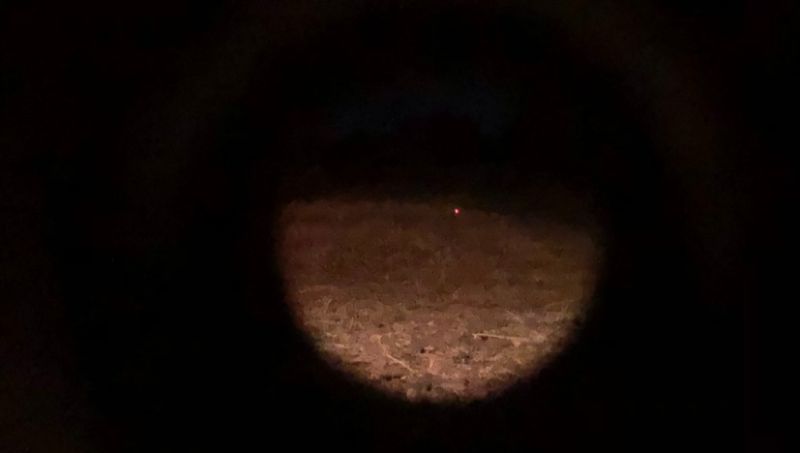
Field Notes: Standouts for low light use are the Holosun, Crossfire, Axiom II and both Sig Sauer sights. The CVLife and Bushnell TRS-25 where too bright in our experience for optimal low light use.
So, not only is it expected that illumination must be daylight bright, it must also become dim enough to be usable and ensure the FOV is too. That’s a lot to demand, and many budget red dot sights do this admirably. Really, the only way to know is to get behind one yourself.
| Product | Total Illumination Settings | Type of Operation |
|---|---|---|
| Holosun HS403B | 12 settings (10 DL & 2 NV) | Button |
| STNGR Axiom II | 11 settings (9 DL & 2 NV) | Side dial |
| Sig Sauer Romeo MSR | 12 settings (10 DL & 2 NV) | Top dial |
| Sig Sauer Romeo 5 | 10 settings (8 DL & 2 NV) | Button |
| Ozark Rhino | 5 red settings/5 green settings | Side dial |
| Vortex Crossfire (CF-RD2) | 11 settings (9 DL & 2 NV) | Side dial |
| Bushnell Trophy TRS-25 | 11 DL settings | Side dial |
| CVLife 1x22x33 | 10 DL settings | Top dial |
Mounts
Mounting systems are a standard, included accessory with red dot sights recommended for rifles. They usually come preinstalled to the red dot, and most can be disassembled to fit an alternative mount.
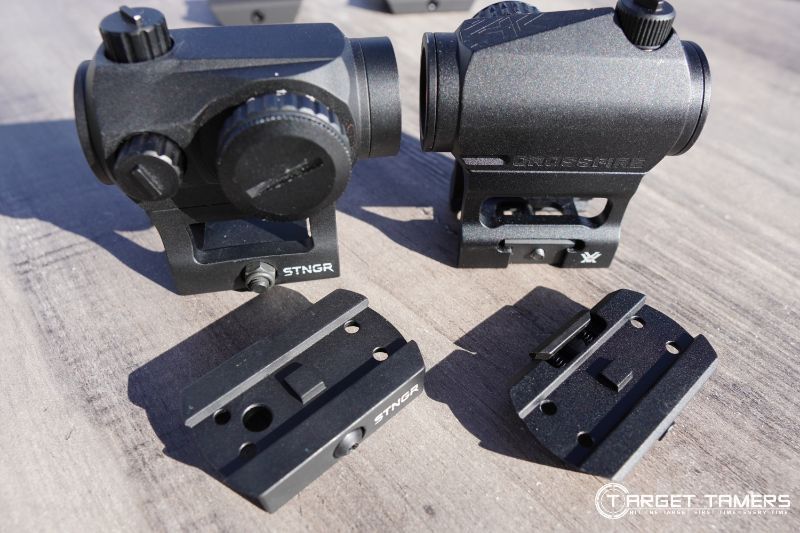
The mounts will fit Weaver and/or Picatinny rails, and a cross bolt and keeper maintain its position and tension between the slots on the rail. The torque specs are usually indicated in the instructions, but when they are not, it’s recommended to torque between 10-20 in-lbs.
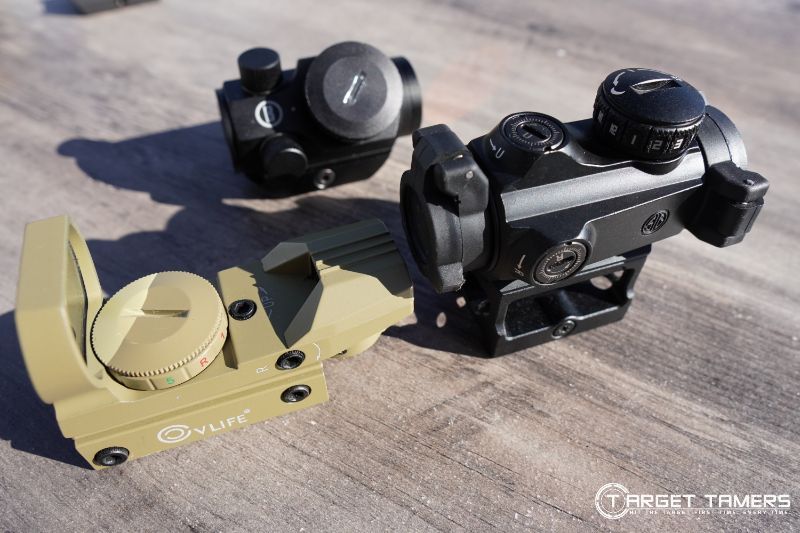
Red dot sights come with different height mounts. Many will include a low-profile mount that is not used with iron sights, is closer to the bore axis, and is typically used on shotguns and AKs.
Riser mounts also come in different heights. The totality of the mounting height is measured from the center of the glass (where the dot should be) on the RDS to the top of the mounting rail. These heights are designed for coupling with standard AR sights.
- 1.41” (36mm) height = absolute co-witness
- 1.63” (40.4mm) height = lower 1/3 co-witness
- 1.54” (38.1mm) height = lower 1/3 co-witness
Pay attention to height of the riser mount included with the red dot sight. Normally, it will be designed for one height for one type of co-witnessing with sights.
Field Notes: Our favorite mounting system was the Quick Detach mount that comes with the STNGR Axiom II since we are constantly switching out optics. The Bushnell TRS-25 and CVLife sights both come with integrated mounts that can't be (or shouldn't be) removed.
| Product | Mount Type 1 | Mount Type 2 | Co-Witness | Footprint |
|---|---|---|---|---|
| Holosun HS403B | Low-profile | 1.63” riser | Lower 1/3 | T1 |
| STNGR Axiom II | Low-profile | 1.63” QD riser | Lower 1/3 | T1/T2 |
| Sig Sauer Romeo MSR | 1.41” riser | N/A | Absolute | T1 |
| Sig Sauer Romeo 5 | Low-profile | 1.41” riser | Absolute | T1 |
| Ozark Rhino | 1.41" cantilever | N/A | Absolute | N/A |
| Vortex Crossfire | Low-profile | 1.63” riser | Lower 1/3 | T1 |
| Bushnell TRS-25 | Low-profile integrated | N/A | N/A | N/A |
| CVLife | 1.41” integrated | N/A | Absolute | N/A |
FAQ’s
1. Holosun Paralow HS403B
2. STNGR Axiom II
3. Sig Sauer Romeo MSR
4. Sig Sauer Romeo 5
5. Vortex Crossfire CF-RD2
6. Bushnell Trophy TRS-25
7. CVLife 1x22x33
u0022Red dotu0022 encompasses various types of compact optics that use an illuminated dot for the aiming point. Reflex, prismatic, and holographic sights fall under the “red dot” umbrella. Each are made differently but they all provide an illuminated reticle for fast target acquisition, CQB, and speed.
Many red dot sights are effective inside 100 yards. Generally, the larger the dot, the better it is for target acquisition and close quarters while a smaller dot provides precision shooting and perhaps a longer reach. A 2 MOA RDS can be used to go 150-200 yards or further in practiced hands.
Red dot sight housing/frames, mounts, and glass can last a very long time regardless that anodized finishes wear, glass can break, and screws can get lost. However, many are usually concerned with the operating life of a RDS. This is dependent on the life of the battery.
Most red dot sights use a CR2032 battery to power a red LED for dot illumination even though other battery types and dot illumination colors are available and can affect battery runtime.
In general, a single battery will provide a runtime between 10,000-50,000 hours. Poor battery life can be in the hundreds to low thousands. Switching out to a new battery will provide additional years of use.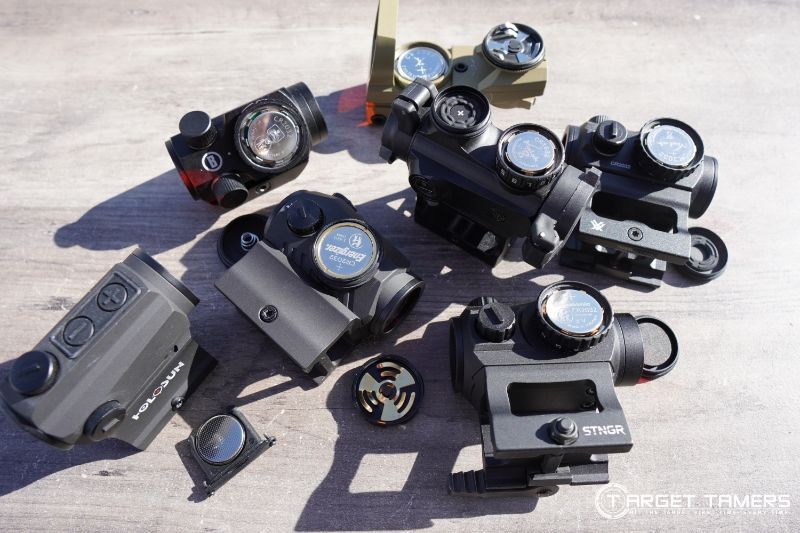
Due to the lack of magnification, red dot sights are designed to be used with two eyes open as the dot is superimposed on the target. The result is an unlimited FOV, strain and concentration shared between two eyes, and preserved peripheral vision.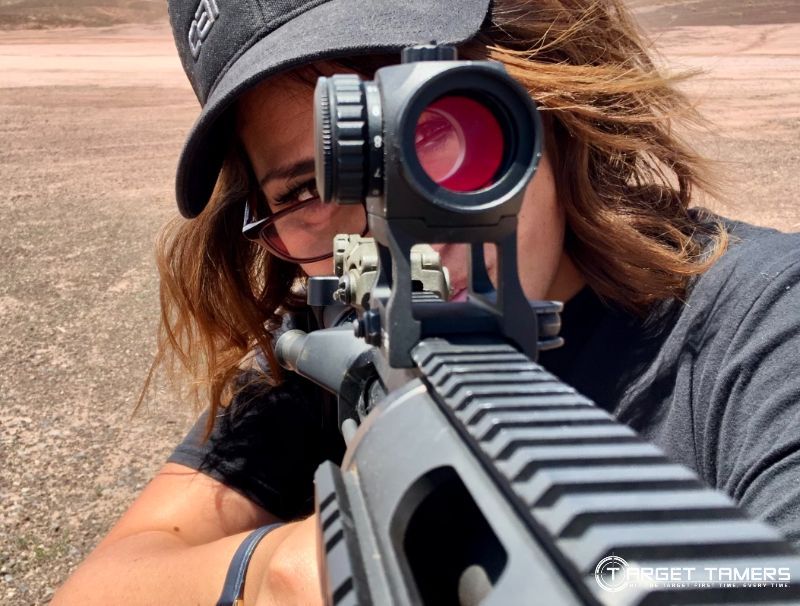
How to Choose the Best Red Dot for YOU
Many of the principles outlined will always apply to beginners and expert shooters alike. Considering dot size, illumination quality, and whether extra features are necessary must be evaluated. The right red dot is the one that is best suited to the application and meets personal preferences.
There are many inexpensive red dot sights available, but the few chosen are highly rated by your peers. We felt obligated to hand-pick and test them all!
Though some are obviously better than others, they all have one thing in common – they’re under $150!







